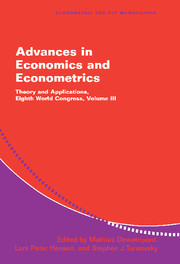Book contents
- Frontmatter
- Contents
- List of Contributors
- Preface
- 1 Contracting Constraints, Credit Markets, and Economic Development
- 2 Factor Models in Large Cross Sections of Time Series
- 3 Macroeconomic Forecasting Using Many Predictors
- “Big Data” Dynamic Factor Models for Macroeconomic Measurement and Forecasting: A Discussion of the Papers by Lucrezia Reichlin and by Mark W. Watson
- 4 How Severe Is the Time-Inconsistency Problem in Monetary Policy?
- 5 New Perspectives on Monetary Policy, Inflation, and the Business Cycle
- Comments on Papers by Stefania Albanesi, V. V. Chari, and Lawrence J. Christiano and by Jordi Galí
- 6 Consumption Smoothing and Extended Families
- 7 Computational Methods for Dynamic Equilibria with Heterogeneous Agents
- Index
6 - Consumption Smoothing and Extended Families
Published online by Cambridge University Press: 06 January 2010
- Frontmatter
- Contents
- List of Contributors
- Preface
- 1 Contracting Constraints, Credit Markets, and Economic Development
- 2 Factor Models in Large Cross Sections of Time Series
- 3 Macroeconomic Forecasting Using Many Predictors
- “Big Data” Dynamic Factor Models for Macroeconomic Measurement and Forecasting: A Discussion of the Papers by Lucrezia Reichlin and by Mark W. Watson
- 4 How Severe Is the Time-Inconsistency Problem in Monetary Policy?
- 5 New Perspectives on Monetary Policy, Inflation, and the Business Cycle
- Comments on Papers by Stefania Albanesi, V. V. Chari, and Lawrence J. Christiano and by Jordi Galí
- 6 Consumption Smoothing and Extended Families
- 7 Computational Methods for Dynamic Equilibria with Heterogeneous Agents
- Index
Summary
INTRODUCTION
Agricultural economies are characterized by substantial fluctuations in individual income. Someof these fluctuations affect all members of the society, whereas others are individual specific. Income fluctuations do not have to translate into consumption fluctuations (that people abhor given convex preferences). However, all too often, income fluctuations induce (perhaps mitigated) consumption fluctuations. Moreover, there is evidence that idiosyncratic risk is not fully insured even within relatively small and closed groups. Udry (1994), for instance, discussing his evidence from rural Nigeria, states that “it is possible to reject the hypothesis that a fully Pareto-efficient risk-pooling allocation of village resources is achieved through these loans. The mutual insurance network available through these loans to households in rural northern Nigeria is important, but it is in complete” (p. 523).
We think of agricultural societies (villages and islands) as both having undeveloped financial markets and being small enough so that anonymity does not exist within the village. At the same time, however, information about idiosyncratic shocks could be difficult to convey to the outside world. In other words, these societies might have limited enforcement capability. The lack of developed financial markets prevents the members of these societies from borrowing and lending and from insuring both among themselves and with the outside world. The fact that, within the economy (or smaller subsets of agents), information problems are negligible, while enforceability problems might be serious, suggests the modeling framework to use when thinking of what type of institutions may develop to substitute for the missing markets. In short, the only type of arrangement that may be possible is self-enforcing contracts, that is, contracts that are sustained by the mutual interest of the parties of maintaining the relationship.
- Type
- Chapter
- Information
- Advances in Economics and EconometricsTheory and Applications, Eighth World Congress, pp. 209 - 242Publisher: Cambridge University PressPrint publication year: 2003
- 5
- Cited by



